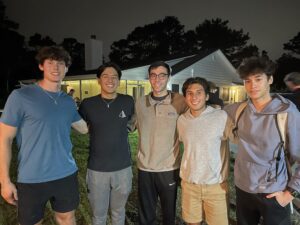ORLANDO | Bridget Newsum didn’t want to be in Chicago, but her husband Nick was doing his fellowship there.
She had two small children, one on the way, and lived on a tight budget after giving up a job in physical therapy. When she wasn’t changing diapers or doing laundry, she found herself scrolling through Facebook.
“You can get stuck comparing yourself to others, of what you think their life is like when it’s really not. They’re just showing you the best version of their life. And you’re looking at it on your worst day and thinking, why can’t I have that?” she said.
Newsum was experiencing “fear of missing out” or FOMO. What she discovered was a shift in mindset could lead to JOMO, the “joy of missing out”.
Today Newsum has five children and the Holy Family, Orlando, parishioner loves her life as a stay-at-home mom.
“I think social media takes away a lot of the joy of where I am and it takes away a lot of my time,” she said. Now she spends more time reading Scripture. “It’s about looking at every day little graces.”

Newsum earned a doctorate from the University of Florida and always assumed she would go back to work after maternity leave. But trying to juggle family and work was a struggle. “It was difficult trying to give up my career that I had worked for so long,” she said.
She prayed about her choice and a shift in mindset made all the difference. “I get to be there to help a sick child. I get to be their comfort. I think this is one of the closest relationships that shows how God views us as His children,” she said.
Rather than wondering how life could be different, she is finding joy in missing out on other options. She chose something that gives her life meaning and purpose. “What you surround yourself with is what you think about,” she added.
As a mental health counselor for Catholic Charities of Central Florida, Catherine Galda notes FOMO is not new. The internet, with infinite options and doorways to comparison, has exacerbated the feeling.
“FOMO induces a low to moderate level of disease, discord and anxiety in a person who isn’t really clear in what their identity is,” she said noting this is heightened in people ages 13 to 25. “In that general age range, you’re trying to figure out who you are and where you fit in the world, who your people are, what your beliefs and values are, how you feel about your faith — all those important decisions that happen during that time. When we look at social media and our peers, we are constantly looking to see who’s doing it better than us. Who’s got more ‘going on.’ That’s where FOMO takes its hold.
“If we are mindful or purposeful in the moment, it opens up the capacity for joy, gratitude, happiness, connections — all those positive things that we are all searching for anyway.”
Galda said when one chooses something that is meaningful, purposeful, there is less anxiety and greater contentedness. “JOMO is about being okay in the space you’re in within the context of your own skin,” she noted.

Jack Livingston, a sophomore at the University of Central Florida recalled experiencing FOMO mostly in high school. “That was before I had a spiritual and a faith-filled goal,” he said. “Once I moved into college and got deeper into my faith, I realized the number one goal is to get to heaven.”
With a goal in mind, FOMO was wiped out. He acknowledged there are many good things from which to choose, making decisions an overwhelming task. That’s when knowing what you really want in life comes in.
“Being set and focused on those goals will allow you to say no in those moments when you’re torn between your yes and your no,” he noted.
It leads to finding great joy in sticking with his commitments. Livingston leads a men’s small group for Catholic Campus Ministry every Thursday night. “Thursday night, I’m almost at the end of the week and tired. It’s a long day of meetings and classes,” he said. “Sometimes I’ll get there thinking, ‘Ach, it’s going to be a long night. I could be doing something else right now,’ but there’s not been a time that I don’t leave having a deeper vigor in my faith, a deeper love for the guys that I’m with, and a deeper love for God – just blessings and thankfulness for what He’s done for me and that He placed me there.”
“I think (FOMO) happens to everybody,” said Rachel Bulman, a mother of six children ages 13 to 2. “You have this thing you want to do, or you want to go somewhere, or you see someone doing something online and there’s this comparison of – I wish I could do that or, there was a time when I could do that. I think that it’s just a natural temptation of humanity to want to wish away the present moment.”
As a Catholic speaker, Bulman frequently travels and finds herself somewhat unsettled being away from family. Her experience makes the moments at home even more significant. “I think the way I’ve always gotten out of (FOMO) is to look at one of my children, and to know that this present moment is with them and if I miss it, I’m going to miss things I can never get back,” she said.
Pastor of Holy Family Parish, Father Martin Nguyen said this is what Lent is all about. “We always think of Lent as what we have to give up. Often, we have such a negative view that giving up of something is entirely penitential, as a means to inflict sacrifices upon ourselves. But by saying no to some of these unessential things, ultimately, we can put aside the distractions to focus on what truly fulfills– that relationship with God.”
Father Nguyen believes the anxiety so many of us experience is symptomatic of a crisis of decisions. So many things demand our attention.
“If we allow ourselves to sit for a little bit and listen to the quietest voice that says ‘Choose me’- that’s the voice of Jesus Christ – then everything else will fall into place and we will lose nothing.” Paraphrasing Pope Benedict XVI, he encouraged, “Open the door to Christ. He will take nothing away from you, but in turn He will give you eternal happiness.’”
By Glenda Meekins of the Florida Catholic staff, March 15, 2024

